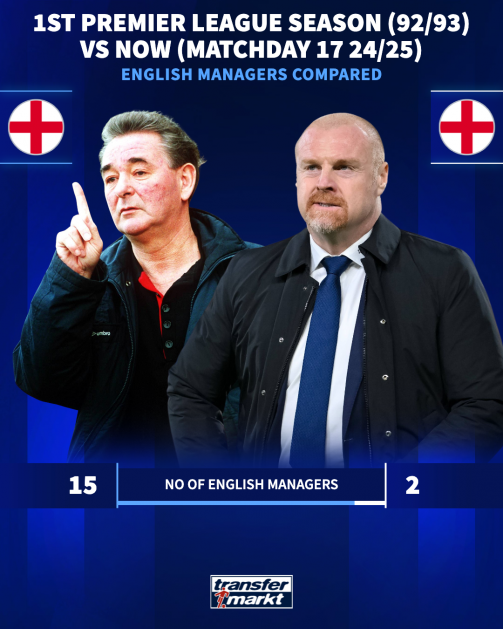Our Terms & Conditions | Our Privacy Policy
O’Neil & Martin latest casualties – Why are there so few English managers in the Premier League?
Lowest domestic coach % in top 10 leagues
©TM/IMAGO
When German Thomas Tuchel was appointed as the new England manager a few months back, it was met with scepticism from some English supporters. It led to questions about why there was a lack of suitable English coaches ready to take the job and whether work was needed in the UK to improve the path for top domestic coaches. In the 31-year history of the Premier League, not a single English manager has ever won the league. Sir Alex Ferguson and Sir Kenny Dalglish (both Scottish) are the only two British managers to even lift the trophy. Last weekend both Gary O’Neil and Russell Martin were sacked as Wolves and Southampton managers respectively.
Those dismissals have taken the number of English managers currently plying their trade in the Premier League from three to just two bosses, whilst also losing another Brit in Martin, who represented Scotland. Eddie Howe and Sean Dyche are the only two domestic managers still standing. It’s the lowest amount of English managers in charge in Premier League history, and with Portuguese Vitor Pereira favourite for the Wolves job, and German Danny Röhl and Spaniard Carlos Corberán reportedly favourites for the Southampton job, that number doesn’t look like increasing anytime soon. If we look at how the Premier League compares to the other top 10 leagues in terms of the percentage of domestic coaches, the results are damning.

Why are there so few English managers in the Premier League?
As showcased in the graphic above, the stark contrast in the percentage of domestic managers in the Premier League and the other nine of the top-10 leagues is mind-boggling. Following O’Neil’s sacking, just 10% of the managers in the English top-flight are English right now. The next lowest league on the list is the Bundesliga in which 50% of the managers are German. If we look at the other top-five leagues the difference is even larger – 56% of the managers in Ligue 1 are French, 70% of the bosses in LaLiga are Spanish, and as many as 80% of the managers in Serie A are Italian.

In the first Premier League season (1992/93) 15 of the managers were English. The division had 22 teams at that time, meaning 68.2% of the men in the dug-out were domestic managers. That figure has steadily fallen across the last few decades. The last season which started with double figures of English managers was back in 2008/09, when there were 10 English bosses. 11 of the 16 seasons before that had at least 10. The number dropped to four in 2012/13, and has stayed around that figure other than a brief rise to eight for a few seasons. Now it’s at its all-time lowest.
When searching for the reason behind this demise of English managers, there could be many factors. The Premier League has probably become the most universal football league on the planet, with supporters from every corner of the planet tuning in. That same globalisation has been effecting the players – stars from 61 different nations are represented in the 2024/25 season. Now this effect is also more noticeable than ever on managers too. There are currently five Spanish bosses (over double the English amount), two Portuguese managers, two Dutchman, a Austrian, a German, an Australian, an Italian, a Dane, and a Northern Irishman.
In terms of there being top level English players ready to go into management, the country should really be blessed, but so far those of the ‘Golden generation’ to try their hand at being a manager have struggled for success. Frank Lampard was sacked at Everton and Chelsea and is now in the Championship with Coventry. Wayne Rooney was sacked at Birmingham and is in the Championship with Plymouth. Steven Gerrard was sacked at Aston Villa and is now in the Saudi Pro League. Perhaps the coaching incentives and methods are just behind England’s European counterparts.
In 2017, according to The Guardian, Spain boasted a whopping 15,089 coaches who held either the Uefa Pro or Uefa A qualification. The numbers are extraordinary, especially when compared to just 1,796 qualified coaches in England the same year. The prices also tell their own story. Whereas the Spanish A licence cost €1,160 and the Pro licence cost €1,293 in 2017, enrolling on the A licence in England would have cost a whopping €4,407 and a staggering €11,958 to complete the Pro licence – if there were even any places available on the handful of courses at St George’s Park. For English managers to begin prospering again the whole coaching system probably needs adjustment.
Images are for reference only.Images and contents gathered automatic from google or 3rd party sources.All rights on the images and contents are with their legal original owners.



Comments are closed.